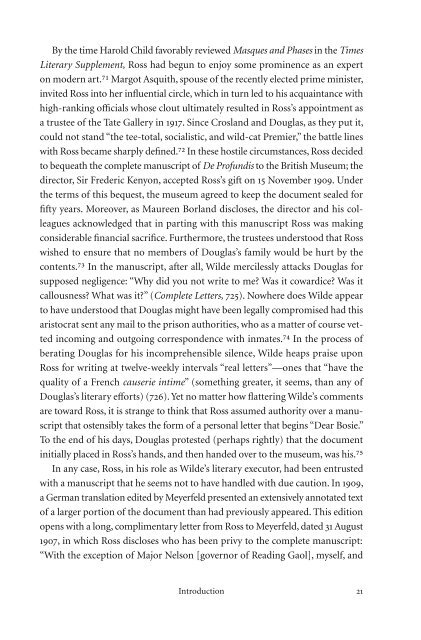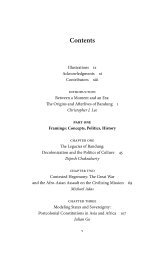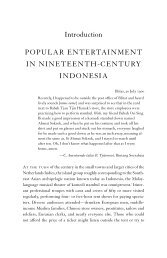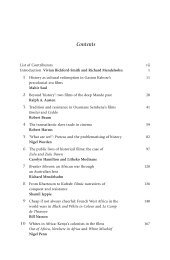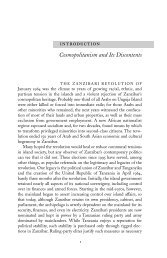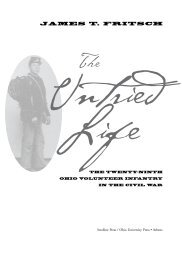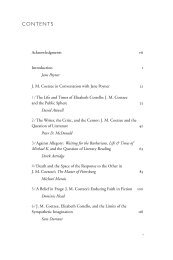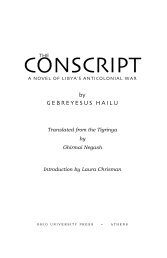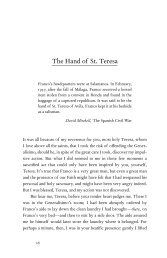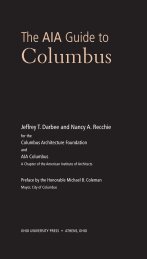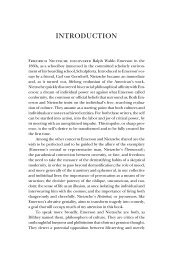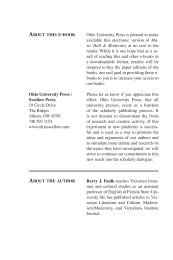Oscar Wilde and Modern Culture - Ohio University Press & Swallow ...
Oscar Wilde and Modern Culture - Ohio University Press & Swallow ...
Oscar Wilde and Modern Culture - Ohio University Press & Swallow ...
Create successful ePaper yourself
Turn your PDF publications into a flip-book with our unique Google optimized e-Paper software.
By the time Harold Child favorably reviewed Masques <strong>and</strong> Phases in the Times<br />
Literary Supplement, Ross had begun to enjoy some prominence as an expert<br />
on modern art.⁷₁ Margot Asquith, spouse of the recently elected prime minister,<br />
invited Ross into her influential circle, which in turn led to his acquaintance with<br />
high-ranking officials whose clout ultimately resulted in Ross’s appointment as<br />
a trustee of the Tate Gallery in 1917. Since Crosl<strong>and</strong> <strong>and</strong> Douglas, as they put it,<br />
could not st<strong>and</strong> “the tee-total, socialistic, <strong>and</strong> wild-cat Premier,” the battle lines<br />
with Ross became sharply defined.⁷² In these hostile circumstances, Ross decided<br />
to bequeath the complete manuscript of De Profundis to the British Museum; the<br />
director, Sir Frederic Kenyon, accepted Ross’s gift on 15 November 1909. Under<br />
the terms of this bequest, the museum agreed to keep the document sealed for<br />
fifty years. Moreover, as Maureen Borl<strong>and</strong> discloses, the director <strong>and</strong> his colleagues<br />
acknowledged that in parting with this manuscript Ross was making<br />
considerable financial sacrifice. Furthermore, the trustees understood that Ross<br />
wished to ensure that no members of Douglas’s family would be hurt by the<br />
contents.⁷³ In the manuscript, after all, <strong>Wilde</strong> mercilessly attacks Douglas for<br />
supposed negligence: “Why did you not write to me? Was it cowardice? Was it<br />
callousness? What was it?” (Complete Letters, 725). Nowhere does <strong>Wilde</strong> appear<br />
to have understood that Douglas might have been legally compromised had this<br />
aristocrat sent any mail to the prison authorities, who as a matter of course vetted<br />
incoming <strong>and</strong> outgoing correspondence with inmates.⁷⁴ In the process of<br />
berating Douglas for his incomprehensible silence, <strong>Wilde</strong> heaps praise upon<br />
Ross for writing at twelve-weekly intervals “real letters”—ones that “have the<br />
quality of a French causerie intime” (something greater, it seems, than any of<br />
Douglas’s literary efforts) (726). Yet no matter how flattering <strong>Wilde</strong>’s comments<br />
are toward Ross, it is strange to think that Ross assumed authority over a manuscript<br />
that ostensibly takes the form of a personal letter that begins “Dear Bosie.”<br />
To the end of his days, Douglas protested (perhaps rightly) that the document<br />
initially placed in Ross’s h<strong>and</strong>s, <strong>and</strong> then h<strong>and</strong>ed over to the museum, was his.⁷₅<br />
In any case, Ross, in his role as <strong>Wilde</strong>’s literary executor, had been entrusted<br />
with a manuscript that he seems not to have h<strong>and</strong>led with due caution. In 1909,<br />
a German translation edited by Meyerfeld presented an extensively annotated text<br />
of a larger portion of the document than had previously appeared. This edition<br />
opens with a long, complimentary letter from Ross to Meyerfeld, dated 31 August<br />
1907, in which Ross discloses who has been privy to the complete manuscript:<br />
“With the exception of Major Nelson [governor of Reading Gaol], myself, <strong>and</strong><br />
Introduction 21


